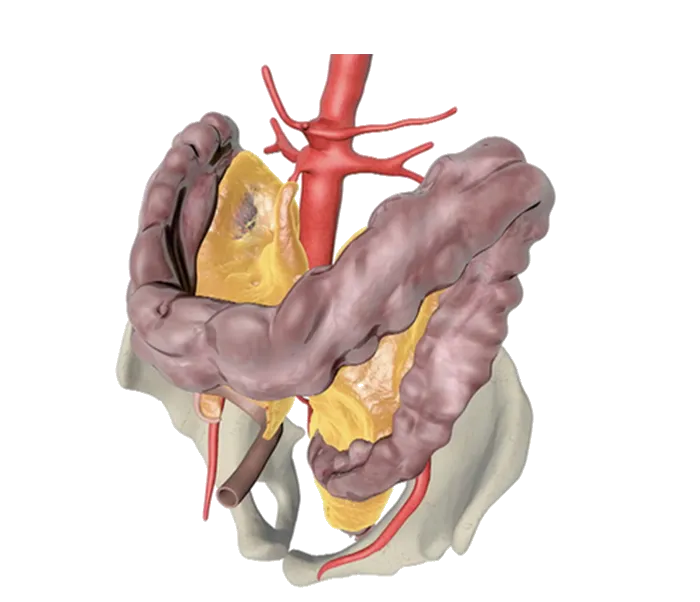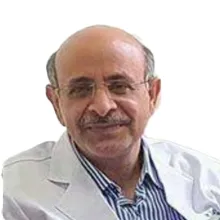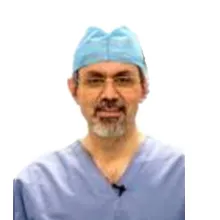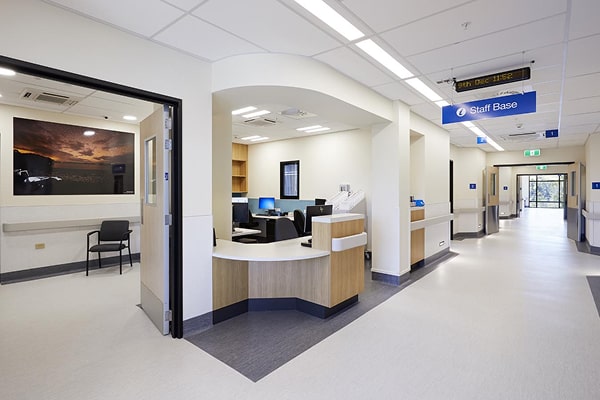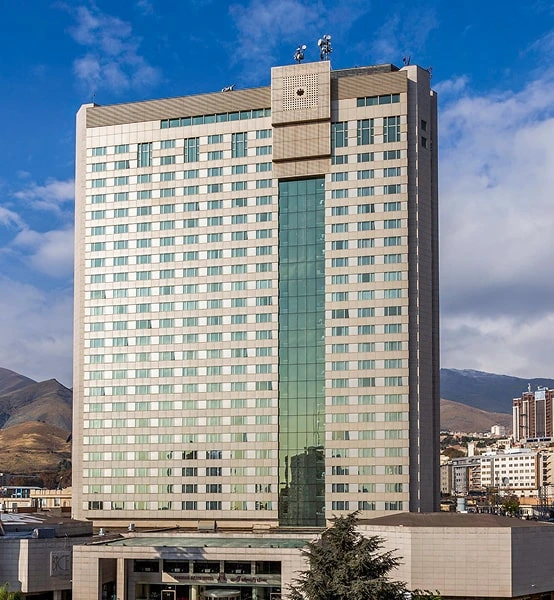Small bowel surgery is a highly specialized procedure within gastrointestinal surgery, performed to treat a variety of small intestine conditions. These may include removal of obstructions, tumor resection, treatment of inflammatory bowel disease, and other intestinal disorders. Using advanced surgical techniques and modern technologies, small bowel surgery allows patients to overcome digestive issues and return to their normal lives.
CCKAAM, as a pioneer in medical tourism services, provides a complete care journey from initial consultation to post-operative follow-up for both domestic and international patients. This article explores the benefits of undergoing small bowel surgery in Iran and the premium services offered by CCKAAM.
Overview of Small Bowel Surgery
- Type of Treatment: Advanced small bowel surgical procedures
- Anesthesia: Local or general, based on the patient’s needs
- Surgery Duration: 1 to 2 hours, depending on the procedure
- Recovery Time: Typically 2 to 4 days
- Success Rate: Over 90% in most cases
Expected Benefits: Improved bowel function, resolution of obstructions or tumors, and enhanced quality of life
Benefits of Small Bowel Surgery in Iran with CCKAAM Services
- Experienced and Specialized Surgeons
Iranian surgeons trained at prestigious international institutions are known for their precision and expertise in small bowel procedures. - Advanced Medical Technology
Iranian hospitals use modern technology to ensure successful, high-precision surgeries. - Cost-Effective Treatment
Significantly lower treatment costs compared to other countries—without compromising on quality or results. - Comprehensive Medical Travel Services by CCKAAM
From medical visas and hotel bookings to airport transfers and interpreter services, CCKAAM manages every step of the patient’s journey. - 24/7 Ongoing Support
CCKAAM provides round-the-clock assistance, allowing patients to stay connected with their care team via video or WhatsApp at any time.
Conclusion
Small bowel surgery is one of the most effective treatments for gastrointestinal disorders and can greatly improve quality of life. With world-class surgeons and advanced facilities, Iran is an ideal destination for these procedures. CCKAAM, through its unparalleled services, ensures a smooth, safe, and successful treatment experience.
If you’re seeking an affordable and effective solution for small bowel conditions, contact us today to start your healing journey with CCKAAM.
Small Intestine Surgery and Related Diseases in Iran: Advancements, Benefits, and Treatment Process
Introduction
The small intestine is a vital part of the digestive system, responsible for the digestion and absorption of nutrients. Diseases and disorders related to the small intestine can significantly impact the quality of life. These conditions include intestinal obstruction, Crohn’s disease, diverticulitis, tumors, and other digestive disorders. This article examines small intestine surgery treatments and the advantages of undergoing these procedures in Iran, highlighting the importance of seeking treatment at advanced medical centers in the country.
What is Small Intestine Surgery?
Small intestine surgery refers to a series of surgical procedures performed to treat various diseases or disorders affecting the small intestine. These surgeries can include the removal of parts of the small intestine, repair of obstructions, tumor treatment, and other complex gastrointestinal surgeries. Small intestine surgery is particularly necessary when medical treatments or lifestyle changes are not effective in addressing the issue.
Common Small Intestine Diseases
Several diseases and disorders can affect the small intestine, some of which require surgery. These include:
- Small Intestinal Obstruction: Obstruction can result from adhesions after surgery, tumors, or conditions such as Crohn’s disease.
- Crohn’s Disease: This chronic condition causes inflammation and ulceration in the small intestine, and severe cases may require surgery.
- Tumors: Benign and malignant tumors can develop in the small intestine, and surgery is performed when removal is necessary.
- Celiac Disease: This condition causes sensitivity to gluten and damage to the small intestine, requiring surgery in certain cases.
- Small Intestinal Diverticulitis: Inflammation of small intestinal pouches, which can lead to surgery.
Small Intestine Surgery: Types of Procedures
There are various methods for performing small intestine surgery, depending on the type and severity of the disease. Some of the most common methods include:
- Open Surgery: In this procedure, a large incision is made in the abdominal area to access the small intestine. This method is typically used for more complex conditions, such as large tumor removal or severe obstructions.
- Laparoscopic Surgery: This minimally invasive method involves making several small incisions through which a camera and surgical tools are inserted. This technique results in less pain and a shorter recovery time.
- Robotic Surgery: This advanced surgery uses robotic systems to perform the operation. Robotic surgery offers high precision and is generally used for complex surgeries.
Why Iran is an Ideal Destination for Small Intestine Surgery
Iran is a leading destination for small intestine surgery due to its specialized surgeons and advanced medical equipment. Below are some of the benefits of having small intestine surgery in Iran:
- World-Class Experienced Surgeons
Iranian surgeons in the field of gastrointestinal diseases and small intestine surgery have received advanced training and have international experience. Many Iranian doctors have studied at top medical universities worldwide and possess the expertise needed for performing complex surgeries. - Modern Medical Equipment
Iran utilizes advanced medical technologies, allowing surgeons to perform surgeries with high precision and minimal risk to the patient. The use of modern equipment such as advanced imaging systems and surgical lasers helps deliver faster and higher-quality treatments. - Affordable Costs
One of the main reasons international patients choose Iran for treatment is the significantly lower medical costs compared to Western countries. Patients can receive high-quality care at a fraction of the cost they would incur elsewhere. - Medical Tourism Services
Iran offers extensive services for international patients, including online consultations, medical visa assistance, travel coordination, accommodation in hotels near medical centers, airport transfers, and translator services to facilitate communication with doctors. - Post-Surgery Care
A major advantage of receiving treatment in Iran is the comprehensive post-surgery care. Iranian doctors and medical teams provide thorough follow-up care, ensuring faster recovery through modern methods.
Treatment Process for Small Intestine Surgery in Iran
The treatment process for small intestine surgery in Iran is outlined in the following stages:
- Initial Consultation and Diagnosis
The first step in the small intestine surgery process is a medical consultation and examination of the patient’s condition. During this phase, the doctor will use advanced tests and imaging techniques to make an accurate diagnosis. - Surgical Planning
After the diagnosis, the doctor will determine the best surgical approach and develop a treatment plan for the patient. This plan includes details about the type of surgery, the duration of the procedure, and the post-surgery care required. - Surgery
The surgery may be performed as an open, laparoscopic, or robotic procedure, depending on the nature of the disease and the patient’s condition. - Post-Surgery Care
After the surgery, the patient will receive careful post-operative care, including medications to reduce pain and prevent infections. The patient will need to stay in the hospital for a period to ensure full recovery. - Follow-Up Care
Once discharged, the doctor will continue to monitor the patient’s recovery progress, scheduling follow-up consultations and examinations as needed.
Conclusion
Small intestine surgery is a complex treatment requiring high specialization and precision. With expert doctors, advanced equipment, and affordable costs, Iran has become an ideal destination for treating small intestine-related diseases. International patients traveling to Iran can benefit from comprehensive medical and medical tourism services, ensuring a comfortable and effective treatment experience.
If you are seeking treatment for small intestine-related diseases, Iran is ready to provide you with the best specialists and medical services.
The Role of Nutrition in Preventing and Treating Small Intestine Surgical Diseases
Introduction
The small intestine is a vital part of the digestive system, primarily responsible for digesting food and absorbing nutrients. Various diseases and disorders affecting the small intestine can significantly impact an individual’s quality of life. Surgeries related to the small intestine, such as treating conditions like intestinal obstruction, Crohn’s disease, tumors, and other gastrointestinal disorders, are sometimes the only option for treating these issues. Alongside these surgical treatments, proper nutrition plays a critical role in preventing diseases and improving the recovery process following small intestine surgery. This article explores the importance of nutrition in preventing and treating small intestine diseases.
The Role of Nutrition in Preventing Small Intestine Diseases
Proper and balanced nutrition can be one of the most important preventive factors against small intestine diseases. Poor nutrition can lead to severe gastrointestinal issues and exacerbate chronic conditions. Some dietary aspects that are essential in preventing small intestine diseases include:
- A Balanced and Varied Diet
Consuming a variety of nutrients in a balanced way is of significant importance. Fruits, vegetables, whole grains, healthy proteins (such as fish and poultry), and beneficial fats (like unsaturated fats found in vegetable oils) should be included in the diet. Consuming fiber-rich foods is crucial for maintaining intestinal health. Fiber helps stimulate bowel movement and prevents conditions like constipation and colon cancer. - Avoiding Inflammatory Foods
Foods that cause inflammation in the gastrointestinal tract should be limited. These include processed foods, sugars, and saturated fats. Conditions like Crohn’s disease can be aggravated by consuming such foods, so proper nutrition can help reduce inflammation. - Adequate Hydration
Proper hydration is essential for the healthy functioning of the intestines. Regular consumption of water and liquids facilitates the movement of food through the digestive system and reduces the risk of problems such as constipation. - Supplements When Needed
Individuals with digestive disorders or nutrient absorption issues may need to take dietary supplements. For instance, patients with Crohn’s disease may require supplements of vitamin D, vitamin B12, iron, and calcium. These supplements help prevent malnutrition and maintain overall health.
The Role of Nutrition in Treating Small Intestine Diseases
After small intestine surgery or during the treatment of chronic small intestine diseases, appropriate and tailored nutrition plays a crucial role in improving the recovery process. Proper nutrition can accelerate healing, reduce the risk of infections and gastrointestinal issues, and improve overall quality of life. Below are some nutritional aspects following small intestine surgery:
- Proper Diet After Small Intestine Surgery
After small intestine surgeries, patients must follow a specific diet to avoid gastrointestinal complications. Initially, patients should consume simple, easily digestible foods like soups and purees. Gradually, a more solid and varied diet, including low-fat proteins, fruits, vegetables, and whole grains, can be introduced. - Managing Nutrient Absorption
In small intestine surgeries, especially when part of the intestine is removed, nutrient absorption may be affected. This can lead to deficiencies in vitamins and minerals. For example, patients may need to take vitamin and mineral supplements to prevent deficiencies such as vitamin D, iron, or calcium. - Nutrition in Crohn’s Disease
Crohn’s disease is a common small intestine condition caused by inflammation and damage to the intestines. A proper diet can help control inflammation. Patients with Crohn’s disease should avoid consuming fatty, fried, and processed foods. Additionally, consuming small, frequent meals throughout the day can aid digestion and reduce inflammation. - Blood Sugar Control in Diabetic Patients
Diabetic patients need to monitor their sugar intake. Consuming fiber-rich foods can help reduce blood sugar fluctuations. Additionally, patients should avoid foods that cause a rapid spike in blood sugar, such as sugary foods and simple carbohydrates. - Managing Protein Intake
Proteins are essential for tissue repair and the healing of the intestines after surgery. Patients should include healthy protein sources, such as fish, poultry, eggs, and legumes, in their diet to promote faster and more effective recovery.
Important Nutritional Tips in Small Intestine Surgical Diseases
- Avoid Heavy and Fatty Foods: After small intestine surgery, heavy and fatty foods can put excessive strain on the digestive system and make digestion difficult. Therefore, consuming light and low-fat foods is recommended.
- Balanced Diet: To maintain healthy intestines and prevent gastrointestinal issues, following a balanced and varied diet is essential.
- Careful with Salt and Sodium Intake: Excessive salt consumption can cause water retention and high blood pressure. Therefore, patients should avoid salty and processed foods.
Conclusion
Nutrition plays a crucial role in preventing and treating small intestine diseases. A balanced diet rich in fiber and low in fat can help prevent gastrointestinal diseases and accelerate recovery after surgery. Furthermore, paying attention to dietary supplements to address nutritional deficiencies and maintain intestinal health is essential for individuals with absorption disorders. Overall, proper nutrition serves as an important tool in the treatment of small intestine diseases and in improving the quality of life for patients.

